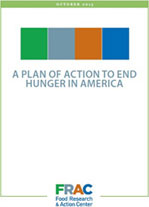Data consistently show that women are especially vulnerable to food insecurity and its health consequences. Research from the U.S. Department of Agriculture (USDA) reveals that household food-insecurity rates for households with children headed by a single mother (30.3 percent) and for women living alone (14.7 percent) are particularly high.
A large body of evidence demonstrates that food insecurity has detrimental impacts on health and well-being in the short and long terms for children and adults. These impacts often hit women — and mothers — especially hard.
Consider the problem of obesity. Based on several literature reviews, there is strong and consistent evidence of a higher risk of obesity among food-insecure women, but not for food-insecure men or children. There are a number of factors that help explain this relationship. For example, mothers struggling with hunger often sacrifice their own quality of nutrition in order to protect their children from hunger, which can increase the mother’s risk of obesity.
Another serious risk facing many women is maternal depression, which can increase the incidence — or be a consequence — of food insecurity. Food insecurity during pregnancy has been linked with gestational diabetes, iron deficiency, and low birth weight.
Federal nutrition programs play a critical role in mitigating the physical and mental health consequences of food insecurity. The Supplemental Nutrition Assistance Program (SNAP) helps all women stretch their food dollars so they can get the nutrition they, or their household, need for an active, healthy life.
According to recent studies from Children’s HealthWatch, mothers of young children in food-insecure households who received SNAP were less likely to experience symptoms of maternal depression and less likely to be in poor health, compared to mothers in food-insecure households not receiving SNAP
Researchers, advocates, and emergency food providers recognize the positive impacts SNAP has on individuals and families, but also know that SNAP benefits are inadequate to fully accomplish their job. Nationally, average monthly benefits amount to just $4.25 per day, or $1.40 per meal. Policymakers should prioritize increasing the monthly SNAP benefit so that more women can become food secure and, as a result, healthier and more financially secure.
Additionally, the Special Supplemental Nutrition Program for Women, Infants, and Children (WIC) provides low-income pregnant women, new mothers, infants, and young children with nutritious foods, nutrition education, and improved access to health care in order to prevent nutrition-related health problems in pregnancy, infancy, and early childhood. WIC’s positive impacts on the health and well-being of mothers and children are well-documented.
SNAP, WIC, and other federal nutrition programs serve as critical supports for food-insecure women. FRAC is working with its network of anti-hunger advocates across the country to protect and strengthen these and other vital nutrition programs, to make sure they are not undermined through block grants, budget cuts, or structural changes. Keeping the nutrition safety net intact will help ensure that women — and all Americans — struggling against hunger lead healthier lives.



